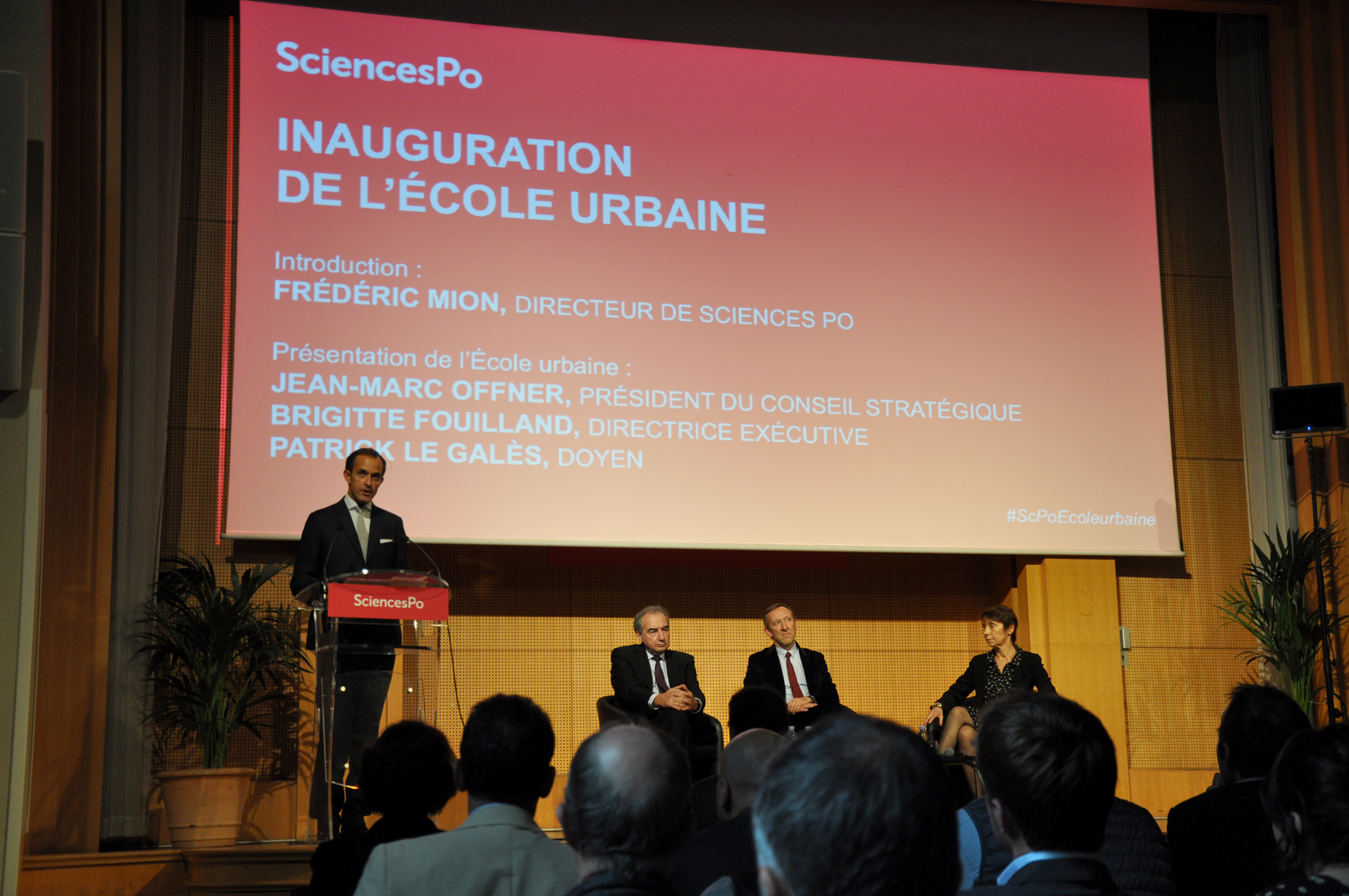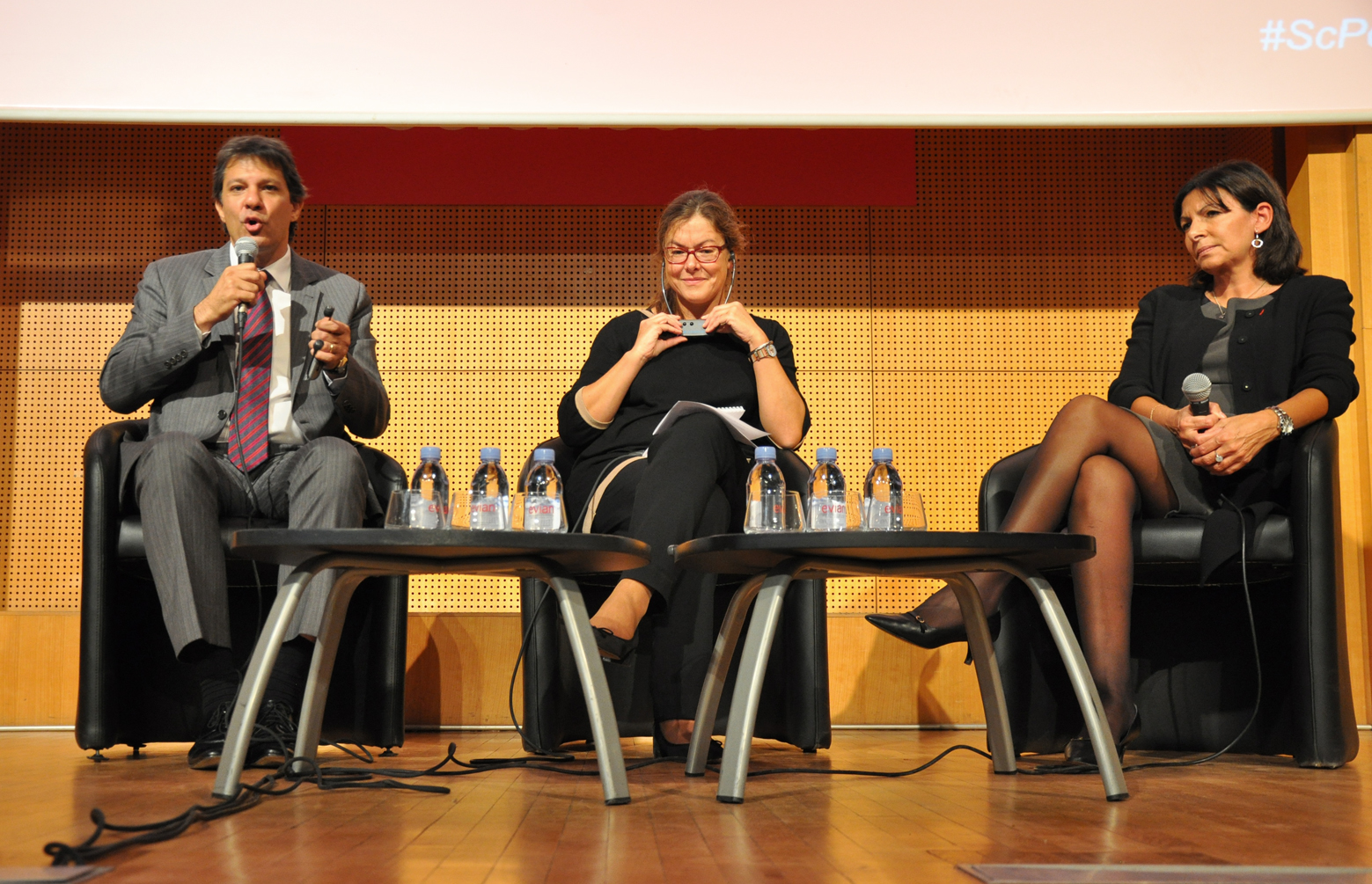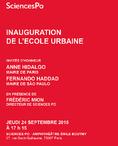urban regeneration conservation & preservation parks citizenship landscape safety & security mega-events simulation participation welfare summer schools public art anthropology architecture digitalization immigration local plans adi heritage urban growth surveys & analyses fragile territories resilience planning landscapes
"Cities transform the world":
the 'École Urbaine' opens in Paris
Martina Busti and Matteo Del Fabbro
One swallow does not make a summer, but two perhaps do. Early this year, the merging of the two historical institutions IFU and IEP led to the establishment in Marne-la-Vallée of the biggest French university concentration in Planning. Then, September 2015 saw the inauguration of the École Urbaine an international and recognisable center for the study of cities governments. SciencesPo, the multidisciplinary institute known all over the world for its excellence in sociology, law, political sciences, economics and history curricula, now houses a new structure that frames the comparative studies of urban policies and practices. The École Urbaine is the culmination of the path that was undertaken more than ten years ago with the Masters in Urban Affairs and, almost 50 years ago, with the Cycle d'Urbanisme, one of the most prestigious programs in town planning in France: an occasion to reflect on the role and aims of urbanism and planning, not only in the old continent, but also the world over.
It is an absolute novelty that the prestigious Parisian institute, on the forefront for the education and research in social sciences, is adding an "urban" touch to a structure traditionally dedicated to train top-level commis d'état. Urbanism now has a new place in the social sciences, which in turn are being transformed and oriented to action, facing the problem of project implementation. However, this is not an isolated attempt by Sciences Po. Other important institutes – in Europe and elsewhere – have recognised the new role of cities and urban governance: from the eminent London School of Economics with its "Cities" project; the doctoral programme "Urbeur" at the University of Milano-Bicocca; to more recent experimental programmes in Italy, such as the Urban Studies programme at the Gran Sasso Sciences Institute in L'Aquila.
All these initiatives set a common problem: the relationship between urbanism and urban studies on one side, and political and social studies on the other. Patrick Le Galès, Dean of the Parisian institute, has the answer: planning and urbanism are part of the realm of public policies; they may not represent the most important field, but their role is surely not without significance. Consequently, these fields have to be studied within a theoretical framework that is wider than the traditional, planning-based one. Nevertheless, this latter approach is of fundamental importance, so much so that students' education (including Sociology and Political Science ones) is structured around collective workshops on issues proposed by public authorities and actors. Indeed, this remains an applicative and planning-based approach, also in terms of professional outcomes.
These approaches are innovative at least on two levels: they originate in contexts that are different from those that have traditionally been associated with urbanism , namely architecture and engineering schools; and they are pioneers in the attempt to train professionals capable of understanding the nuances of power relationships acting on the city, identifying with administrations and institutions, and going beyond consolidated theories and a purely spatial and technological conception of urban environments.
"A professional culture to be invented" can indeed be found in Sciences Po École Urbaine's introductory document. This is why this institute, besides being a turning point in the field of urban studies in France, represents a node in the growing international university network, which aims at giving more depth to a new, hybrid discipline, still finding its place in the academic sphere. 
Mayors of two big "world cities" were invited to École Urbaine's opening, Fernando Haddad of São Paulo and Anne Hidalgo of Paris, thus demonstrating the school's propensity to the practical application of research activities and its intent to deal with current urgent issues (even during training).
Two mayors who – as Le Galès highlighted – have shown the capacity to "take on some risks": Mr Haddad, adopting clear rules for real estate operations, through the Master plan, to guarantee the production of positive externalities for the city. These measures are intercepting a crucial moment in the spatial evolution of São Paulo, a moment that is similar, according to the mayor himself, to the vast haussmannian interventions carried out in 19th century Paris: the planned requalification of large urban areas does influence the inhabitants' quality of life in the long term and brings the issues of housing rights and social justice to the fore.
In Paris there are other challenges; however Mrs. Hidalgo's measures equally attempt to use specific operational tools in order to pursue precise political goals: maintaining the city's social and economic mix, preventing it from becoming a "playground" for the exclusive benefit of tourists and "hyper-bourgeoisie". Following such principles, the share of social housing within the Paris municipality has increased from 13% to 20% between 2001 and 2015, and the objective is to increase it further. This result has been achieved by involving all the private actors of the real estate sector, not by clashing with them.
In both contexts, as stressed upon by the two mayors, a social and political project is strictly associated with the commitments toward environmental issues – such as those that will be taken up by the mayors of 1000 cities all over the world on 4 December 2015 during the COP21 in Paris. The task of "progressive mayors" is to link the social dimension to the environmental dimension and to avoid establishing separate agendas. To attain this, urban (and metropolitan) political leaders need greater independence vis-à-vis central political powers. It is not by chance that both Mr. Haddad and Mrs. Hidalgo broached the topic of the political affirmation of cities which, however, as they pointed out, must be shaped within a national project.
In one of the most prestigious places for crafting scientific and intellectual thought in Europe, a new space is now open for training policymakers, experts, field workers and researchers capable of "understanding the world to transform it", as Sciences Po's strategic vision reads. More precisely, understanding contemporary cities and metropolises through a comparative and interdisciplinary approach; and trying to transform them according to political projects expressing capacities of collective action.
TRAINING NEW EXPERTS IN URBAN AFFAIRS
Urban issues, from planning to policymaking, are placed at the heart of the new school's project. The École Urbaine gathers more than 350 students enrolled in three Masters courses that last two years each and the Cycle d'urbanisme, now directed by Marco Cremaschi, that lasts one year: "Urban and territorial strategies" (in French), "Urban policy" (joint program with the London School of Economics, in French and English), "Governing the large metropolis" (in English) and the Executive Master "Metropolitan governance" (in French).
A large number of students come from abroad, and many have previously attended universities other than Sciences Po, in France and abroad. In particular, the Urban planning and Design course is undertaken by architects, planners and engineers who, after graduation, are looking to broaden their skills. All Masters' programmes include theoretical and practical aspects that consist of teamwork on assignments given by public and private actors. All students carry out internships in partner institutions and firms in Europe and abroad.
Moreover, on the occasion of the school opening, two new courses were introduced: a one-year Executive Master in "Metropolitan governance" (in French) and a MOOC in "Urban sociology for a globalizing urban world" (in English).
The establishment of the École is part of the general rearrangement of the courses offered at Sciences Po, where six thematic Schools (Journalism, Communication, Law, International affairs, Economics, and Public policy) and one Doctoral school have been established since 2003.
These structures are primarily devoted to organising teaching activity, whereas research is organised through nine Research Centres, three of which are associated with the École Urbaine: the Centre for European Studies (Cee), the Centre for Sociology of Organisations (Cso) and the Observatory for Social Change (Osc). An undeniable contribution also comes from the research programme "Cities are back in town".
Martina Busti (emai: martina.busti@gssi.infn.it) and Matteo Del Fabbro (email: matteo.delfabbro@gssi.infn.it)are Phd students at Gran Sasso Science Institute and visiting PhD students at Sciences Po's Centre d'Études Européennes.
Related articles:
Online resources and links




Planum
The Journal of Urbanism
ISSN 1723-0993
owned by
Istituto Nazionale di Urbanistica
published by
Planum Association
ISSN 1723-0993 | Registered at Court of Rome 4/12/2001, num. 514/2001
Web site realized by ChannelWeb & Planum Association | Powered by BEdita 3






